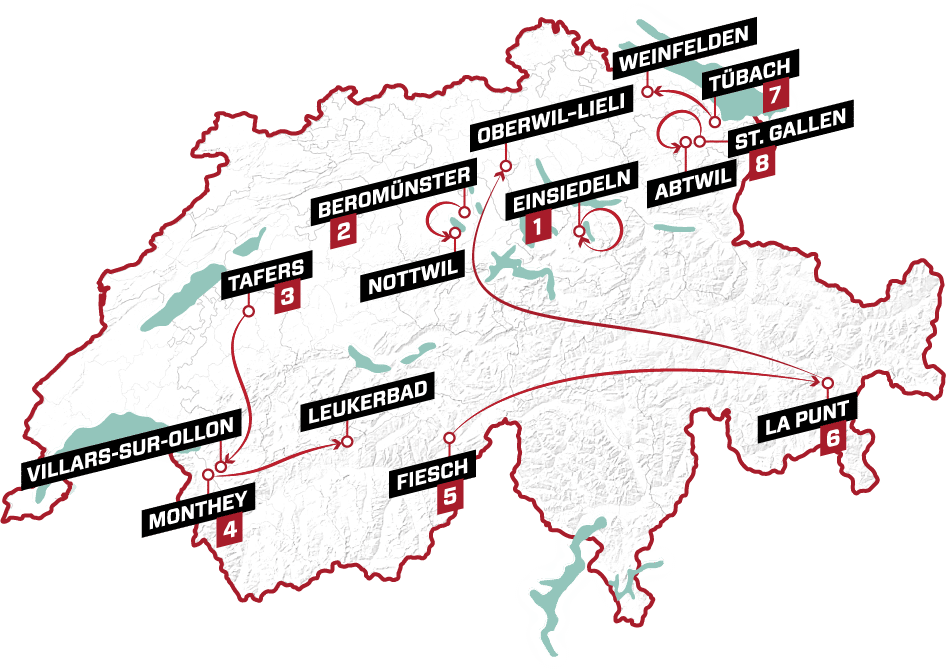








The 86th edition of the Tour de Suisse, June , begins in central Switzerland before heading westward to Fribourg, Vaud and Valais regions. The Queen Stage, on the fifth day features the Alpine crossings of Furka, Oberalp and Albula.The route will then move eastward to the Thurgau and St. Gallen regions for the two final stages, ending the eight-day race with a time trial. The race divvies out plenty of climbing – more than 18,000 metres over 1097 kilometres in eight days.
This year's opener is an individual time trial in the monastery village of Einsiedeln on June 11, 2023. Though not considered a classic prologue at 12.7km long, stage 1 is expected to be a fast time trial with small time gaps for the contenders.
Stage 2 heads to the Mittelland for a hilly 174km circuit between Beromünster and Nottwil. However, as is often the case in Switzerland, sprinter stage or not, the terrain is not completely flat. In addition to speed, riders must overcome a total of 1,890 metres in altitude before they can fight for the stage win.
Stage 3 with 2677 metres of climbing, the first stage in the French-speaking region of Switzerland, will provide the first mountain finish of the Tour de Suisse 2023. After the start in Tafers, the category 1 Col des Mosses is the first major obstacle of the day. The final climb to Villars-sur-Ollon is that the real test comes at the end of the 144km stage.
After more than 70 years the Tour de Suisse returns to Monthey for stage 4, which starts off with a 24 kilometre loop. Though the first 80 kilometres is completely flat, this stage will by no means be a rest day. The first challenge will take place on the ascent to Crans-Montana, a category 1 climb, 96km into the stage. The route follows more roller coaster terrain until the mountain finish in Leukerbad. The peloton will climb 1,500 metres of altitude on the 152.5km stage.
The Queen Stage on June 15, 2023, has 4,700 metres of altitude difference spread over 211 kilometres. With the Alpine passes of Furka (the highest peak of this year’s Tour de Suisse), Oberalp and Albula, this will be an extremely tough stage. Shortly after the start in Fiesch, the peloton will begin climbing the hors categorie Furkapass (2,429m), with the summit coming 38.7km after the drop of the flag. The climb of the category 1 Oberalp Pass follows quickly. The third and final climb of the day, the hors categorie ascent of Albula Pass (2312m), crests with only 10 kilometres left in stage 5. The last kilometres will also require honed descent skills on the way to the finish in La Punt.
Stage 6 at 215km, is the longest of this year’s Tour de Suisse. From the start in La Punt, the riders have to master the Albula Pass from the opposite direction to the previous day. A series of flat sections precede a steady up-and-down course for the last 50 kilometres or so. The last 2.4 kilometres to the finish are uphill to the finish in Oberwil-Lieli.
The concluding weekend of this year's men's tour will start with a classic stage from Tübach to Weinfelden. Starting off with a flat start loop along Lake Constance, the 160km long stage 7 passes through the hilly Appenzell region. The terrain gets hillier with short and punchy climbs at the course enter the half-cantons of Appenzell Inner- Ausserrhoden before flattening out slightly on the way to the finish. This penultimate stage could provide a final opportunity for the sprinters to steal the limelight.
Stage 8, on June 18, is the 25.7km individual time trial from St. Gallen to Abtwil with 415 metres of climbing.







